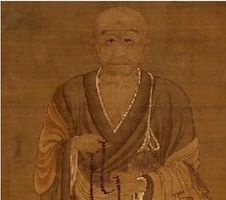Genshin
| English Phonetics | Genshin |
|---|---|
| Sort Name | Genshin |
- Eshin Sōzu (Head Monk of Eshin)
| Birth: | 942 |
|---|---|
| Death: | 1017 |
| Place of birth: | Yamoto province (present-day Nara prefecture), Japan |
Tibetan calendar dates
- Religious Affiliation
- Tendai
- Teachers
- Ryōgen
Biographical Information
Japanese Tendaishū monk, scholar, and artist, popularly known as Eshin Sōzu (Head Monk of Eshin) because he spent much of his life at the monastery of Eshin at Yokawa on Hieizan. Genshin was born in Yamoto province (present-day Nara prefecture), but after losing his father at a young age, he was put in the care of the Tendai center on Mt. Hiei. It is believed that during his teens he formally joined the institution and became a student of the Tendai reformer Ryōgen (912–985). Genshin first gained a name for himself in 974 due to his sterling performance in an important debate at Mt. Hiei. Eventually, Genshin retired to the secluded monastery of Shuryōgon'in in Yokawa, where he devoted the rest of his life primarily to scholarship. Genshin wrote on a wide array of Buddhist topics related to both Tendai and Pure Land practices and is also regarded as the founder of the Eshin school of Tendai, which espoused the notion that everyone in inherently awakened (J. hongaku). (Source: "Genshin." In The Princeton Dictionary of Buddhism, 318. Princeton University Press, 2014. http://www.jstor.org/stable/j.ctt46n41q.27.)
- Wiki Pages
- Person description or short bio
Expand to see this person's philosophical positions on Buddha-nature.
| Is Buddha-nature considered definitive or provisional? | |
|---|---|
| Position: | |
| Notes: | |
| All beings have Buddha-nature | |
| Position: | |
| If "Qualified", explain: | |
| Notes: | |
| Which Wheel Turning | |
| Position: | |
| Notes: | |
| Yogācāra vs Madhyamaka | |
| Position: | |
| Notes: | |
| Zhentong vs Rangtong | |
| Position: | |
| Notes: | |
| Promotes how many vehicles? | |
| Position: | |
| Notes: | |
| Analytic vs Meditative Tradition | |
| Position: | |
| Notes: | |
| What is Buddha-nature? | |
| Position: | |
| Notes: | |
| Svātantrika (རང་རྒྱུད་) vs Prāsaṅgika (ཐལ་འགྱུར་པ་) | |
| Position: | |
| Notes: | |
| Causal nature of the vajrapāda | |
| Position: | |
